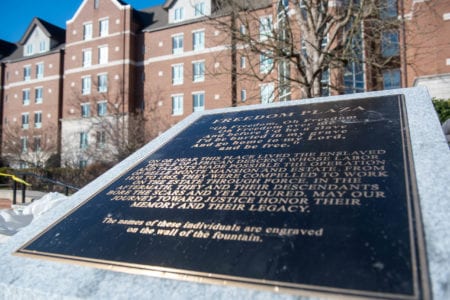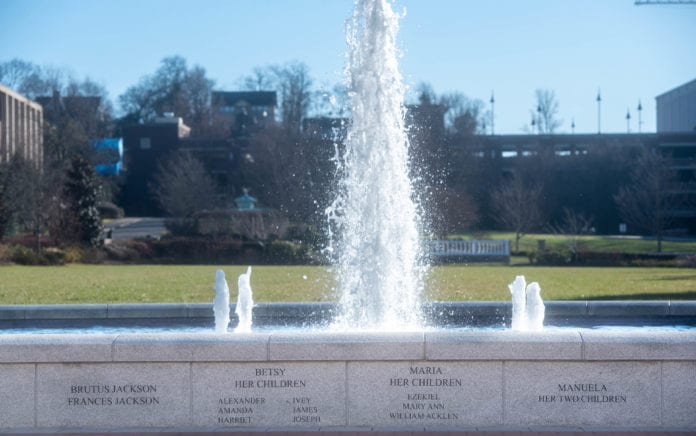In a virtual video ceremony released earlier today, Belmont University dedicated the area surrounding the campus’ iconic fountain as Freedom Plaza to celebrate and memorialize the lives of the enslaved individuals who are known to have labored on the estate owned by Joseph and Adelicia Acklen more than 170 years ago, prior to the establishment of Belmont College. The known names of these people are now inscribed on the fountain, and a plaque has been installed commemorating the naming of the plaza as a reflection of the lyrics to the “Oh Freedom” spiritual along with an inscription that states “May our journey toward justice honor their memory and their legacy.”
Belmont President Dr. Bob Fisher said, “It’s incredibly appropriate to dedicate Freedom Plaza today as we remember the life and impact of Dr. Martin Luther King, Jr. I clearly remember as a young boy hearing Dr. King deliver his ‘I Have a Dream Speech’ and being captivated by his vision for how things could be. We’ve made a lot of progress in the past 50 years, but we have a long way to go. Freedom Plaza invites each person who experiences it to reflect on our collective history. I hope it also encourages us all to consider what we can do to bring about the living change that will be required to make Dr. King’s dream for equality come alive for everyone.”
Last summer Belmont held listening sessions with students, faculty, staff and alumni to discuss the national movement against racism in light of well-known incidents of violence and discrimination. Through those conversations, a number of action steps were identified to further promote a campus culture of inclusion and equity, including seeking ways to expand public knowledge around both the history of the property where the campus sits and the Acklens’ original estate summer home, the Belmont Mansion.
Completed in the early 1850s, Belmont Mansion and estate owned by Adelicia and Joseph Acklen was built by enslaved African Americans, European immigrants and American craftsmen, and it relied on enslaved people and European immigrants to maintain the property through the Civil War. The property was sold in 1887 to a land development company and purchased in 1890 by school teachers Ida Hood and Susan Heron, who opened a school for young women, the original Belmont College, on the grounds. Today, the Belmont Mansion is maintained as a historical museum by the Belmont Mansion Association, a private nonprofit restoration and preservation organization.
Last July, Belmont’s Faculty Senate formally passed a motion that charged a subcommittee to create a monument or marker to address “the relationship between the land on which Belmont sits — along with all the institutions that have been on it — to the practices of slavery, white supremacy and racism.”

Associate Professor of Pharmacy Dr. Anthony Blash, who served on the memorial subcommittee, said, “With each step that you take on Freedom Plaza, I ask that you think about the steps each of us can take as we work toward the best Belmont. As your eyes fall on the names of the enslaved persons that toiled on these lands and to those whose names are known only to God, I ask that you remember that no part of what we do as a University is immune from the forces of oppression, objectification and dehumanization, and that we pledge to identify and challenge these forces as a community.”
The name of Freedom Plaza was inspired by the post-Civil War spiritual “Oh Freedom,” which expresses both the dignity of the formerly enslaved and their yearning for release after emancipation. Lyrics from the song are embedded in the memorial plaque, and the song was performed for the dedication ceremony by Professor of Music and Director of Choral Activities Dr. Jeffery Ames.
“When the last of the enslaved received word of their freedom in 1865, there was a bittersweet reality—this so-called freedom would still be laden with oppression and inequality,” said Ames. “Unfortunately, for descendants of the American slavery system, our freedom remains historically emancipated, but has yet to be fully delivered. The premise of the spiritual combines a longing for freedom, both then and now, and a hope for redemption.”
Belmont faculty, staff and administrators financially supported the creation of the memorial, more than tripling the original $10,000 fundraising goal. In addition to sponsoring the memorial, Faculty Senate has also led a number of new and expanded initiatives related to educational efforts around diversity and inclusion, including the creation of a diversity and inclusion resource guide to assist faculty with course development; partnering with the Teaching Center to provide diversity, equity and inclusion workshops; and prompting initiatives to encourage first-year and other courses to discuss and write about racism and anti-racism efforts, among other projects.



